TERRACYCLE NEWS
ELIMINATING THE IDEA OF WASTE®
Posts with term TerraCycle X
Prefeitura participa do concurso de reciclagem “Brigada de Instrumentos de Escrita’’
Otter Products engineers ruggedized, reusable plastic ready-meals case
 From manufacturing smartphone cases to other products, Otterbox protective solutions maker Otter Products (Fort Collins, CO) now sees a fresh opportunity in a different market: ready-meals transport packaging for ecommerce. Unlike corrugated boxes that dominate the ready-meal delivery landscape, the company’s new Liviri Fresh case is aligned in the direction of the sustainably-minded reusable, refillable system ala Loop (see Game-changing waste-free shopping platform introduced by TerraCycle at Davos, published January 2019).
Unlike Loop, Liviri Fresh is an open-platform approach that will customize and provide the reusable packaging to any ecommerce-delivered ready-meal company in the market.
There’s also a serious health concern to the introduction. In a Rutgers-Tennessee State University study in 2017, researchers who ordered 169 meal kits found that nearly 47% of 684 items ordered arrived with surface temperatures above 40 degrees, rendering them unsafe to consume.
The solution to that food safety problem is the 19.3 inch-long x 15.8-inch wide by 10.7-inch tall (with lid) Liviri Box that provides a total internal volume of 1,700 cubic inches or 29.4 quarts; the box weighs 12.5 lb.
Liviri Fresh is engineered to maintain a 3-day shelf life without using ice.
The boxes are nestable and stackable—40 empty units fit in the same space as 24 units full units. It is designed to maintain temperature for three days without ice or other coolant, though using dry ice provides nearly twice the delivery shelf life to increase the e-delivery options.
Kyle Fanning, Sr Product Line Manager, Otter Products, provides answers to PlasticsToday’s questions.
What is it made of and how is it molded and assembled?
Fanning: Liviri Fresh is made from an extensively-tested and proven grade of polypropylene that has surpassed all required standards for shipping containers. This polymer is recyclable, crack-proof, food grade and chemical resistant. Liviri Fresh boxes are injection molded and assembled in Michigan, utilizing a best-in-class automotive and industrial manufacturer for precision and quality.
What key factors went into design and development?
Fanning: We focused on achieving superior thermal performance—it keeps items in safe temperature range over 80% longer than the top-performing single-use insulation of 1.5-inch-thick recycled denim; durability to achieve up to 75 round trips through the small parcel network; a delightful user experience for both shipper and consumer; and a design-for-recyclability approach at end of life.
How was this size/volume determined?
Fanning: We dialed in the volume over the last year after detailed discussions with many potential customers. We settled on a size that works well as a medium-to-large box for most perishables shippers. It will comfortably fit the most common meal kit configuration of three meals for two people.
What is the nature of the “aerospace-grade insulation”?
Fanning: Vacuum insulated panels provide superior thermal performance over single-use insulation.
What is the cost of each and how many trips to reach ROI?
Fanning: Pricing is variable based on each customer’s unique needs. We’ll offer both purchase and lease options.
What was biggest challenge to development?
Fanning: Creating a product that was both optimized for the customers’ operations during pack out while still hassle-free for consumers. This version is a second-generation design—we poured all of our learnings from our pilot test first-generation design into our current version.
How complex was this to make compared to other Otterbox products?
Fanning: It’s a similar process to our ruggedized consumer coolers, so we have the expertise, but making it rugged enough for the small parcel network took significant design work and testing.
How is it returned? Where and how is it cleaned?
Fanning: The consumer places the included return label on the outside of the box and either sets it out for an auto-scheduled pickup or they can drop off at a shipping location. We have worked out a full cleaning protocol and we can either clean the units at one of our receiving facilities, or we’ll provide the customer with a turnkey approach (protocol and equipment) to do it themselves in their fulfillment centers.
What are the branding opportunities in terms of box decoration?
Fanning: Customers will have two custom branding decals prominently displayed on the box—one on the front and one on the lid.
Has a Life Cycle Assessment been done vs. standard meal-kit delivery packaging?
Fanning: We engaged a leading sustainability consultancy, thinkstep, to conduct a comparative LCA. They have submitted their draft LCA to an independent panel for the critical review process. The study will be complete and available in early April.
What’s the commercial status? Is any brand or retailer using or testing?
Fanning: We conducted a three-month pilot test during the summer of 2018 with two major brands who used our product to ship to their customers. We’re now in discussions with many target customers.
From manufacturing smartphone cases to other products, Otterbox protective solutions maker Otter Products (Fort Collins, CO) now sees a fresh opportunity in a different market: ready-meals transport packaging for ecommerce. Unlike corrugated boxes that dominate the ready-meal delivery landscape, the company’s new Liviri Fresh case is aligned in the direction of the sustainably-minded reusable, refillable system ala Loop (see Game-changing waste-free shopping platform introduced by TerraCycle at Davos, published January 2019).
Unlike Loop, Liviri Fresh is an open-platform approach that will customize and provide the reusable packaging to any ecommerce-delivered ready-meal company in the market.
There’s also a serious health concern to the introduction. In a Rutgers-Tennessee State University study in 2017, researchers who ordered 169 meal kits found that nearly 47% of 684 items ordered arrived with surface temperatures above 40 degrees, rendering them unsafe to consume.
The solution to that food safety problem is the 19.3 inch-long x 15.8-inch wide by 10.7-inch tall (with lid) Liviri Box that provides a total internal volume of 1,700 cubic inches or 29.4 quarts; the box weighs 12.5 lb.
Liviri Fresh is engineered to maintain a 3-day shelf life without using ice.
The boxes are nestable and stackable—40 empty units fit in the same space as 24 units full units. It is designed to maintain temperature for three days without ice or other coolant, though using dry ice provides nearly twice the delivery shelf life to increase the e-delivery options.
Kyle Fanning, Sr Product Line Manager, Otter Products, provides answers to PlasticsToday’s questions.
What is it made of and how is it molded and assembled?
Fanning: Liviri Fresh is made from an extensively-tested and proven grade of polypropylene that has surpassed all required standards for shipping containers. This polymer is recyclable, crack-proof, food grade and chemical resistant. Liviri Fresh boxes are injection molded and assembled in Michigan, utilizing a best-in-class automotive and industrial manufacturer for precision and quality.
What key factors went into design and development?
Fanning: We focused on achieving superior thermal performance—it keeps items in safe temperature range over 80% longer than the top-performing single-use insulation of 1.5-inch-thick recycled denim; durability to achieve up to 75 round trips through the small parcel network; a delightful user experience for both shipper and consumer; and a design-for-recyclability approach at end of life.
How was this size/volume determined?
Fanning: We dialed in the volume over the last year after detailed discussions with many potential customers. We settled on a size that works well as a medium-to-large box for most perishables shippers. It will comfortably fit the most common meal kit configuration of three meals for two people.
What is the nature of the “aerospace-grade insulation”?
Fanning: Vacuum insulated panels provide superior thermal performance over single-use insulation.
What is the cost of each and how many trips to reach ROI?
Fanning: Pricing is variable based on each customer’s unique needs. We’ll offer both purchase and lease options.
What was biggest challenge to development?
Fanning: Creating a product that was both optimized for the customers’ operations during pack out while still hassle-free for consumers. This version is a second-generation design—we poured all of our learnings from our pilot test first-generation design into our current version.
How complex was this to make compared to other Otterbox products?
Fanning: It’s a similar process to our ruggedized consumer coolers, so we have the expertise, but making it rugged enough for the small parcel network took significant design work and testing.
How is it returned? Where and how is it cleaned?
Fanning: The consumer places the included return label on the outside of the box and either sets it out for an auto-scheduled pickup or they can drop off at a shipping location. We have worked out a full cleaning protocol and we can either clean the units at one of our receiving facilities, or we’ll provide the customer with a turnkey approach (protocol and equipment) to do it themselves in their fulfillment centers.
What are the branding opportunities in terms of box decoration?
Fanning: Customers will have two custom branding decals prominently displayed on the box—one on the front and one on the lid.
Has a Life Cycle Assessment been done vs. standard meal-kit delivery packaging?
Fanning: We engaged a leading sustainability consultancy, thinkstep, to conduct a comparative LCA. They have submitted their draft LCA to an independent panel for the critical review process. The study will be complete and available in early April.
What’s the commercial status? Is any brand or retailer using or testing?
Fanning: We conducted a three-month pilot test during the summer of 2018 with two major brands who used our product to ship to their customers. We’re now in discussions with many target customers.
TerraCycle is scrapping “trash” through art
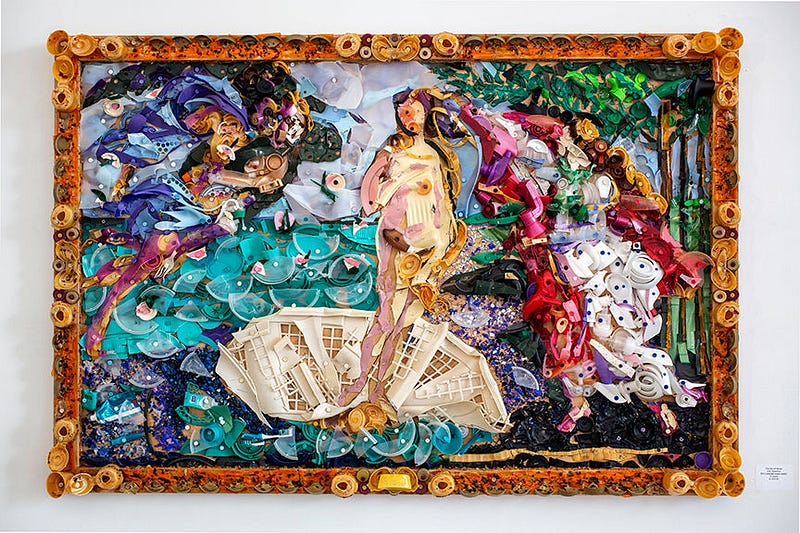
Trash is a human invention. It is a concept that is foreign to the natural world, and a fairly modern one. Today’s complex materials and mass production have given way to products and packaging designed for single-use. These developments have made our lives more convenient and products more affordable, but most of the resulting waste isn’t accepted by public recycling systems and ends up as garbage.
Bringing awareness to this is key to helping us change the way we think about the world’s limited resources. Seeing garbage as something other than a useless problem is the first step to a less wasteful and more prosperous world. Keyword: seeing.
At TerraCycle, we are on a mission to eliminate the idea of waste and do this in a number of ways. Many of you may be familiar with our national recycling programs, our work integrating beach litter into bottles, or the new Loop initiative to move consumables into durable packages. But one of the more visual, easily understood representations of what we do is upcycle “trash” into useful objects, including art.
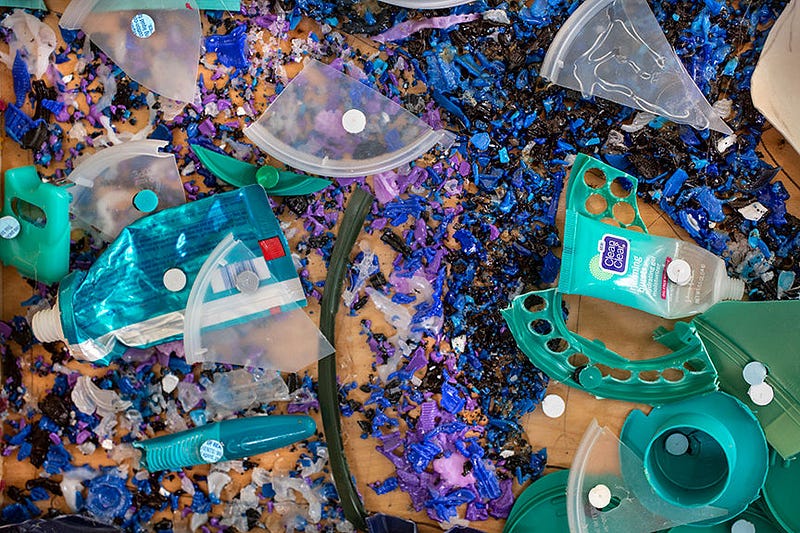
If you visit our offices around the world, you’ll see what I mean. Desks and tables made out of old doors, a Statue of Liberty made of toothpaste tubes, and phone booths repurposed into mini conference rooms. Our largest, the aptly named “Bottle Room,” exists in the middle of our global headquarters and is defined by four walls constructed of clear two-liter plastic bottles, items often thrown away.

We have an entire team of Design Junkies dedicated to finding solutions for needs around the office and creating new, visually stimulating artworks and products for brand partners. We also work directly with local and international artists to provide material they can use to create art
For example, TerraCycle’s Artist in Residence EdE Sinkovics, turns trash into statements about waste by creating assemblages out of discarded materials, such as cigarette butts into portraits of presidents (Lincoln, The Sustainable Republican, 2018), retired canvas mail bags and old tires into sculptures (Rhino Stamp, 2014; Elephant, 2014), and wine corks into human figures (Madam Cork, 2014).
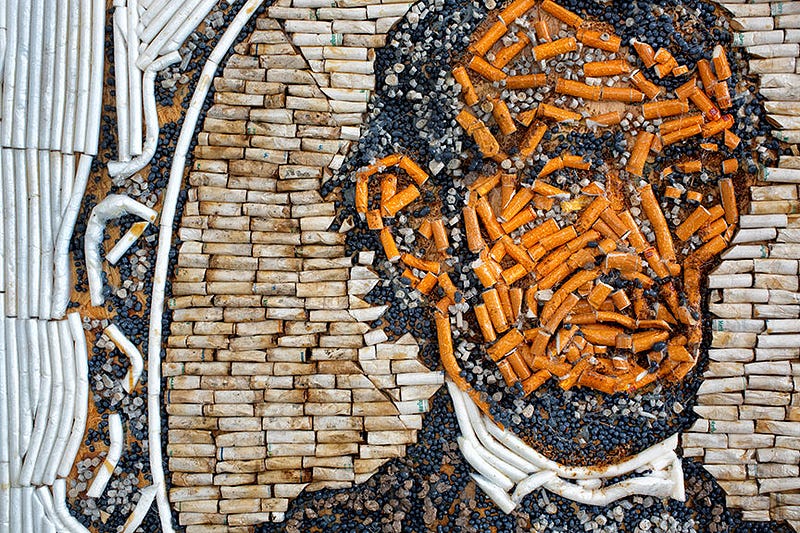
His latest work, The Dirt of Venus, reimagines Botticelli’s famous Renaissance painting, The Birth of Venus. A conversation starter, Venus bears vibrant resemblance to its inspiration while entirely made of trash — ocean plastic, to be exact. These artworks face the viewer with uncomfortable truths. Even the most difficult-to-recycle materials can in fact be made into something useful, even beautiful. And, there’s a lot of plastic pollution out there!
These art pieces currently hang in the special art exhibit Scrapped: A Collection of Upcycled Artwork, our first show in partnership with Downtown Trenton Association at Broad Street Bank Gallery open through April 13. The collection, which includes on-site installations and mixed media pieces of varying styles, also includes on-site installations from acclaimed aerosol artist and friend of TerraCycle Leon Rainbow and Brendon Lopez (Streets Keep Callin, 2019), reclaimed textiles artist Heemin Moonin in collaboration with Dororthy McNee (Green Palace, 2019), and TerraCycle employees.
Scrapped is in line with our mission to change perspectives and connect people through shared experiences. All the featured art utilizes discarded and otherwise “scrapped” materials. Designed to encourage viewers to question their day-to-day lifestyle and their impact on the planet, the upcycled art show transforms garbage into artistic visions that connect the dots between us and the things we throw away.
This exhibit will be back next year, but we intend to continue changing perspectives with our work upcycling and recycling unconventional materials and striving to offer the public a connection to sustainability that empowers and inspires them.
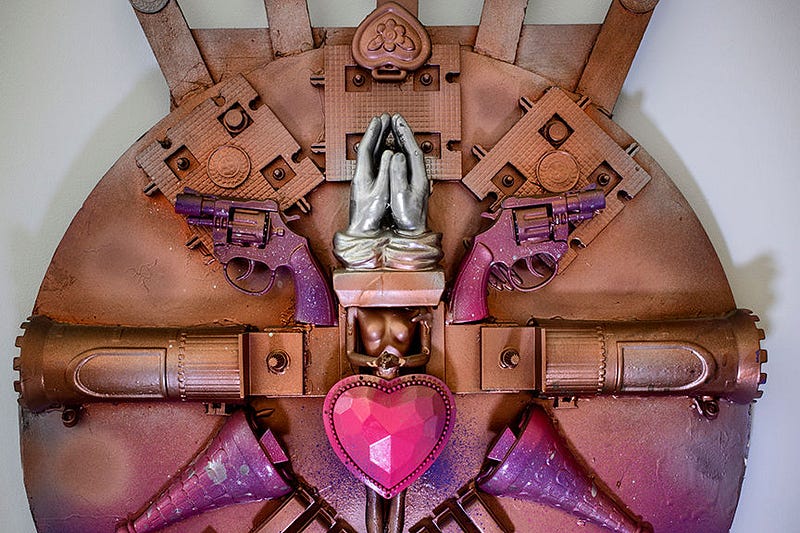
Creativity and community hold the key to solving the world’s greatest problems, including pollution and waste, and art is a language that brings people together. This Earth Month and beyond, find the educational information, media, music and art that moves you, and share it to change the story about trash.
TerraCycle partners With Residents Forward to recycle cigarette butts in Port Washington
Episode 13 – Loop
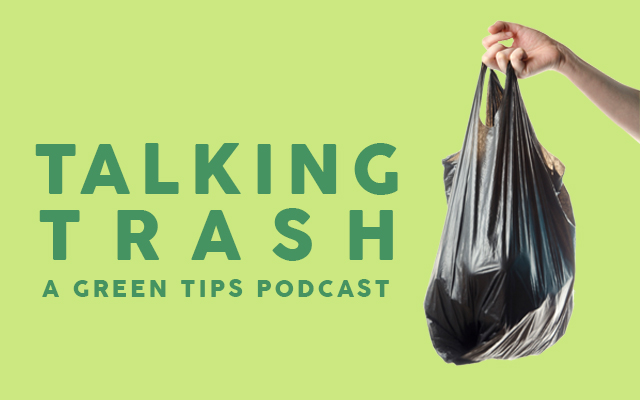 Episode 13 features Tom Szaky, CEO and founder of TerraCycle, the company that’s about to launch Loop. Loop is a zero-waste delivery system for food and other household items and starts in New York next month.
Episode 13 features Tom Szaky, CEO and founder of TerraCycle, the company that’s about to launch Loop. Loop is a zero-waste delivery system for food and other household items and starts in New York next month.
GILLETTE STRIVES TO MAKE ALL RAZORS RECYCLABLE
Pick Up Your Butts
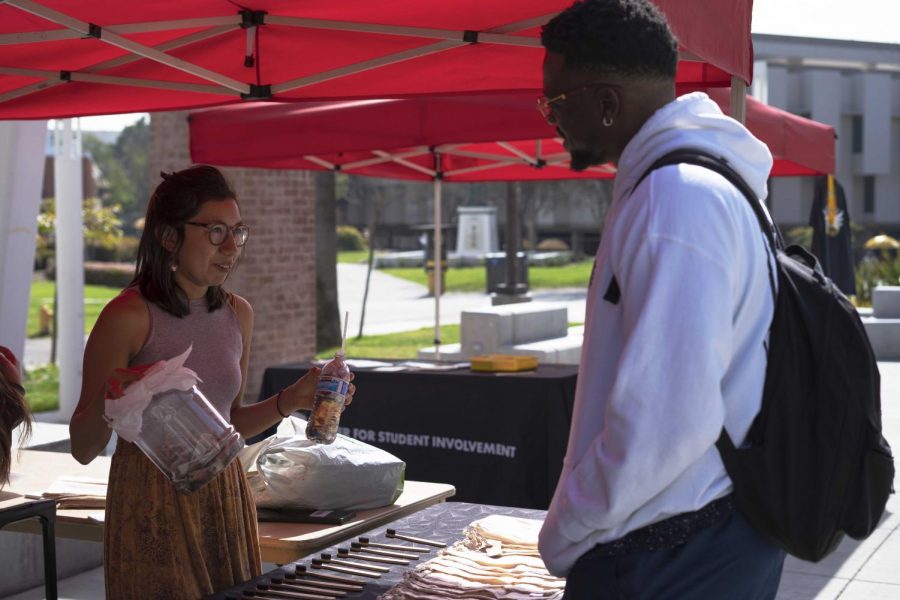 Students and other attendees participated by picking up cigarette butts around the plaza and across various locations on campus including the Engineering, Computer Science and Technology Building.
After signing up at the CSI booth, attendees were provided paper bags and began searching for cigarette butts.
Tables filled with snacks and goodies were available for participants, which included: eco-friendly bamboo toothbrushes, reusable straws, notepads and reusable ziplock bags. Participants were also given a free acai bowl after volunteering.
According to the Lola, Salgado, the event organizer, the cigarette butts collected will then be shipped to TerraCycle, a recycling company where the cigarette butts will be separated into organic and inorganic materials and recycled into park benches or glasses.
The idea for the clean-up event began when CSI took students on trips with local nonprofits who helped pick up trash. Unfortunately, because of class schedule restrictions, attendance was low.
From there, CSI decided to create their own cigarette butt cleanup on campus. Since Cal State LA’s initiative to become a smoke-free campus back in fall 2017, there has been less littering around campus, but there are still places around the university grounds that have this issue.
“Before, there were a lot of cigarette butts in front of the Student Union, like where you can sit down. But now, since the campus is smoke-free, it’s like they’re still there. Across the street is where I find a lot more now”, said Salgado in reference to the crosswalk that leads to the Television, Film and Media Center.
During the first clean up, 5,676 cigarette butts were collected with the help of 40 volunteers. For its second clean up, Salgado hopes to find less litter since the campus has been smoke free for the last two years. By organizing this event, Salgado hopes that she has helped create awareness about littering on campus.
“When you walk around campus or anywhere, you don’t really notice the little things, but once you take some time out of your day to pick up trash and you’re like ‘oh my god there’s so many’, you’ll notice them for a long time.”
Students and other attendees participated by picking up cigarette butts around the plaza and across various locations on campus including the Engineering, Computer Science and Technology Building.
After signing up at the CSI booth, attendees were provided paper bags and began searching for cigarette butts.
Tables filled with snacks and goodies were available for participants, which included: eco-friendly bamboo toothbrushes, reusable straws, notepads and reusable ziplock bags. Participants were also given a free acai bowl after volunteering.
According to the Lola, Salgado, the event organizer, the cigarette butts collected will then be shipped to TerraCycle, a recycling company where the cigarette butts will be separated into organic and inorganic materials and recycled into park benches or glasses.
The idea for the clean-up event began when CSI took students on trips with local nonprofits who helped pick up trash. Unfortunately, because of class schedule restrictions, attendance was low.
From there, CSI decided to create their own cigarette butt cleanup on campus. Since Cal State LA’s initiative to become a smoke-free campus back in fall 2017, there has been less littering around campus, but there are still places around the university grounds that have this issue.
“Before, there were a lot of cigarette butts in front of the Student Union, like where you can sit down. But now, since the campus is smoke-free, it’s like they’re still there. Across the street is where I find a lot more now”, said Salgado in reference to the crosswalk that leads to the Television, Film and Media Center.
During the first clean up, 5,676 cigarette butts were collected with the help of 40 volunteers. For its second clean up, Salgado hopes to find less litter since the campus has been smoke free for the last two years. By organizing this event, Salgado hopes that she has helped create awareness about littering on campus.
“When you walk around campus or anywhere, you don’t really notice the little things, but once you take some time out of your day to pick up trash and you’re like ‘oh my god there’s so many’, you’ll notice them for a long time.”

